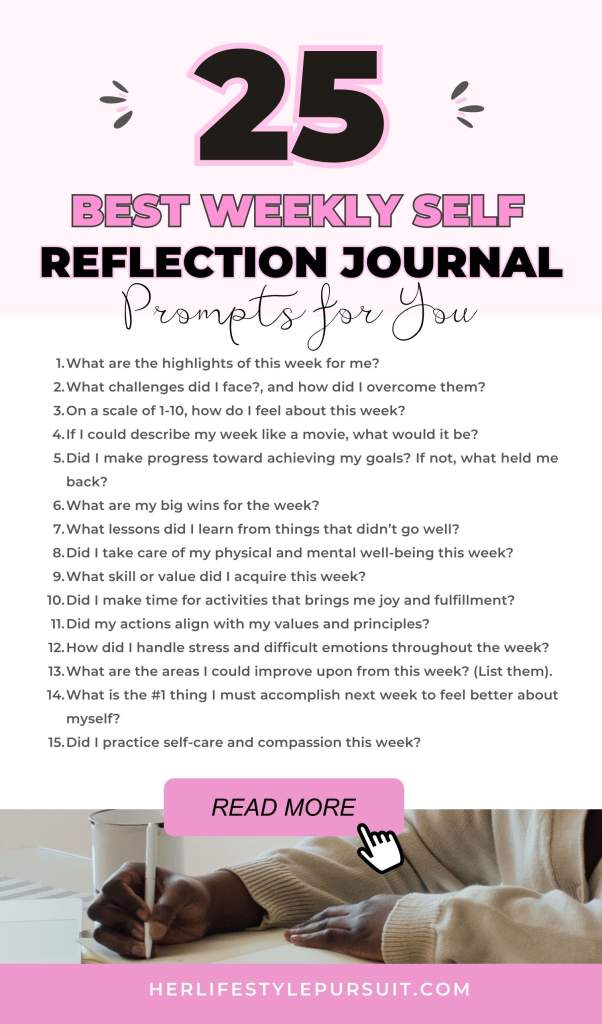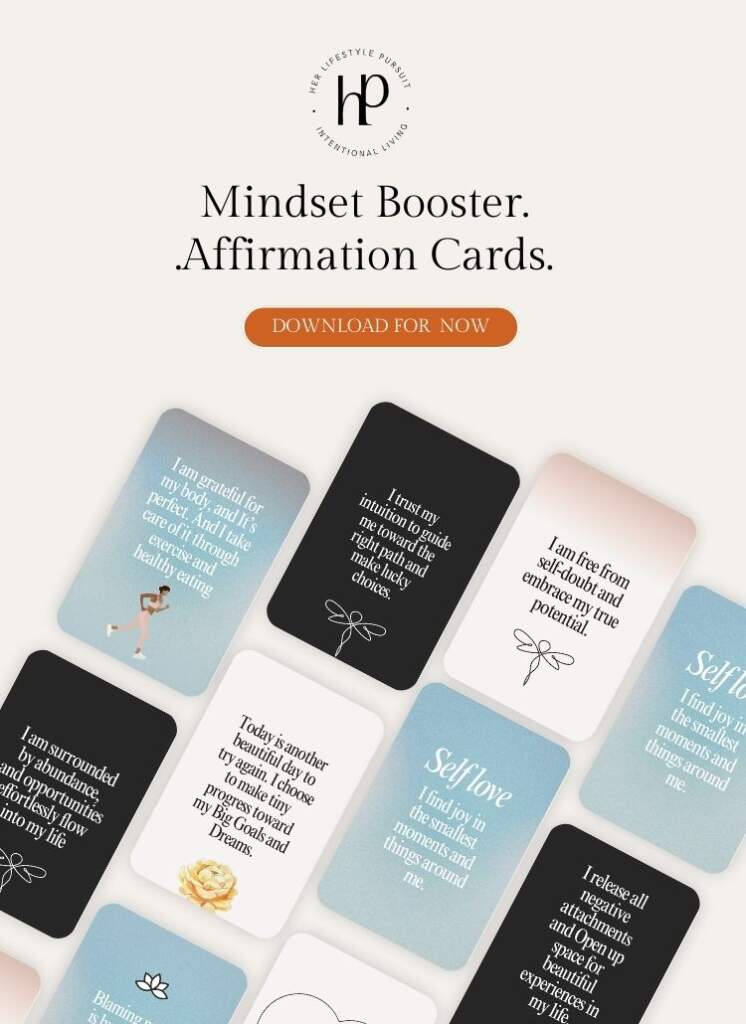Asking yourself some weekly reflection questions and practicing weekly reviews is a game changer and can help you grow.

Imagine starting your week with complete knowledge of what happened the previous week, why you were feeling overwhelmed, and the reason for not achieving your weekly goals.
Perhaps you had a blissful and productive past week and would like to repeat the same feeling the next week, but things don’t seem to go how you want them to.
Honestly, life can be chaotic sometimes, and it’s so easy to lose sight of our goals, passions, and even ourselves, taking us backward in our personal development journey.
And That’s where the power of weekly reflection comes into play.
Taking time to do a weekly review and asking yourself good weekly reflection questions can help you boost your productivity and allow you to get in tune with your emotions.
Setting aside time to reflect on your week helps to build self-awareness, and it’s a perfect way to hold yourself accountable and regularly check in with yourself.
Because when having a weekly reflection, you’ll ask yourself deep, thought-provoking questions that will help you learn from your challenges, make adjustments where necessary, and serve as a guide for taking on the new week.
So if you’re stuck and want to get the hang of your week but need help figuring out where to start with weekly reflection, this guide is for you.
After reading this blog post, you’ll know how to do a weekly review, why you should reflect on your week, and arm yourself with good questions for weekly review, so you can take charge of every new week.
But before that, what is weekly reflection? Is weekly reflection the same thing as having a weekly review?
This post may contain affiliate links, which means I’ll receive a commission if you purchase through my link, at no extra cost to you. Kindly read the full disclosure here.
What is a Weekly Reflection?
Weekly reflection is intentionally looking back at the week to understand how things went, what worked, why it didn’t work out, and why you feel that way.
Doing weekly reflection involves setting aside time to think and understand all our activities, actions, results, lessons, and actions taken to understand ourselves and evaluate our goals and progress.
But here’s the catch, weekly reflection is more about personal growth and self-improvement.
As you look at your week, your focus is on You and nothing else. While;
What is Weekly Review?
Although a “weekly review” is similar to having a reflection, they are not the same.
Practicing Weekly review involves setting aside time and looking back at the week, focusing on your productivity, work, events, activities, to-do lists, priorities, progress you made, time management, etc.
When doing a weekly review, you’ll ask yourself questions like;
- what went well?
- Did I accomplish my goals for the week?
- How was my time management?
- What are my priorities and goals? Did I achieve them?
Meanwhile, what are Weekly Reflection Questions?
What are Weekly Reflection Questions?
Weekly reflection questions are prompts that can help you review and reflect on your week with self-growth and improvement in mind.
Questions for weekly reflection help you reflect on your past week, evaluate your progress, set goals for the new week, and plan action to achieve those goals.
Sometimes, you want to reflect on your previous week but need help figuring out where to start.
With weekly reflection prompts, you can ask yourself more profound questions and gain insight, and better understand yourself, thus helping your self-development journey.

Why do Weekly Reflection?
Doing weekly reflection is a game changer and helps you gain insight into your habits, triggers, why, and how you spend your day and can help you prioritize and, most importantly, have a deeper understanding of yourself.
Consistently practicing reflection, not only weekly but monthly and yearly reflection, helps you become self-aware and intentionally align your goals, purpose, and passion.
For Instance, In 2022, I reviewed my week, but not consistently, and I could care less about setting weekly goals or breaking down my weekly task.
However, in January 2023, I began doing weekly reflection consistently in my journal, and this helps me to evaluate, think on paper, and, most importantly, never lose track of what’s essential in my life.
Taking a few minutes to hours to reflect at the end of the week is essential.
But, if you want to truly reap the benefits of practicing weekly reflection, you must make it a habit to reflect weekly.
Additional benefits of consistently doing weekly reflections are;
- You’ll become self-aware and understand yourself better
- It helps assess whether your actions and choices align with your long-term goals and values.
- You’ll gain lessons, experiences, and insight into your life.
- It provides a means for you to be accountable and track your growth.
- You’ll become more grateful and ease your stress.
Now you know “what is weekly reflection” and the benefits of intentionally reflecting on your week. How do you start Weekly reflection?

How to do Weekly Reflection Step By Step
You want to take your weekly reflection game seriously but don’t know where to start.
Here is how to do weekly reflection step by step, so you can set aside time and reflect on your week and experiences.
1. Set Aside Time to do Weekly Reflection
One mistake people make is doing reflections whenever they feel like it. Instead of setting aside time to reflect, review, and evaluate their week before planning a new one.
If you want to truly reap the benefits of practicing weekly reflection, you should create time in your schedule for reflecting and planning instead of doing it spontaneously.
For Instance, I reflect on my week on Saturday or Sunday afternoon before or after practicing my self-care day (I do it before or after, depending on my mental health. I don’t do weekly reflection when I’m tired or bothered).
Dedicating time to review your week review, helps you take a step back from the hustle and bustle of life to evaluate your thoughts and experiences and peek into the past week uninterruptedly.
So, dedicate at least 1 hour to review your week, and do it when you’re not tired.
2. Find a Quiet Space
Practicing weekly reflection requires focus and concentration without distractions, and if you’re anything like me, you want to spend time with your thoughts uninterruptedly.
So, find a quiet and designated place to call your “think space.” Sit in this place and pour your thoughts into your weekly reflection journal.
For someone like me who lives alone, it’s easier to reflect without interruptions as all I need to do is put away my phone and sit at my desk for at least an hour.
But if you live with others, supposing you have a family, then you should set boundaries and let your kids or loved ones know you want to observe your “Me time.”
Or you can wake up a little earlier than others and include your weekly reflection plan in your morning or night routine if that works for you.
3. Use a Weekly Reflection Journal
Have you ever gotten a new notebook and can’t wait to use it?
Using a weekly reflection journal or specific journal to review your week will not only help you reflect better but will also help you build consistency.
If you are yet to get a journal for practicing weekly reflection, you should, as it gives you an organized place with all your thoughts about the 52 weeks in a year.
Imagine after the end of the year. You can pick up a journal and look back on your emotions, thoughts, wins, lows, and experiences for each week of the year. How incredible!
Additionally, your weekly serves as a dedicated space to express your thoughts, emotions, and experiences, celebrate your wins, and critique your choices over a week in a conversational style.
Since I have a list of weekly reflection questions, I ask myself weekly and have been seeing results with them. I use the five minutes journal to reflect weekly.
4. Review and Reflect on the Previous Week
The purpose of reviewing our week is to ensure that your weekly actions align with your overall long-term goals and values.
To begin your weekly reflection, you should revisit your goals, clarify your values, and think carefully about what happened the previous week and how you can become more effective.
What are the goals you set for yourself at the beginning of the week?
For example, one of my goals for this week is to eat healthy (healthy meals from a 4-day meal plan recommended by my nutritionist).
Therefore, in my weekly review, I’ll evaluate if I accomplished my goal, if I’m satisfied with the results, and what I can do to improve it.
i. Start with clarifying your values;
In your weekly reflection journal, clarify what went well this week and if it aligns with your values and overall long-term progress plan. To do this, ask yourself these self-reflection questions;
- What are my core values and goals? (It could be for the year or long term for weekly reflection, I keep it at yearly plans).
- Which actions or choices did I take this week that aligns with my core values?
- What moments did I feel the most alive and aligned with my true self this week?
- What values did I prioritize in my actions and decisions this week?
- On a scale of 1-10, how motivated am I about my goals at the end of this week? What can I do to boost my enthusiasm and drive?
Additionally, review your goals, daily task, and personal development plans and milestones you hit.
Doing this will help you reflect better, refresh your memory, provide a foundation to access your week, and set intentional goals for the new week.
5. Use Weekly Refection Journal Prompts
Use Reflection prompts to understand, identify, evaluate, and reflect on your week, how you feel, and discover where you’re at.
Also, use these weekly reflection journal prompts and practice the free hand or brain dump journaling technique.
PS: This is my favorite method of journaling, as it allows me to share my emotions and thoughts unfiltered)
- Did I make progress toward my goals?
- What are the most significant moments from the past week, and how did they affect me?
- What are my biggest and small wins this week, and how do they make me feel?
- What emotions did I experience this week, and what were their triggers? Did I manage these emotions well?
- What actions brought me closer to my goals this week?
- What lessons did I learn from mistakes and setbacks this week? How can I apply these lessons to future situations?
- What challenges did I face this week, and how did I overcome them?
- In what ways did I practice self-care and nurture my well-being this week?
- Did you learn something about yourself this week? What is it?
- List 5 things you can improve upon next week.
6. Evaluate and Prioritize
After clarifying your weekly goals, the next step is evaluating and prioritizing.
Carrying out evaluation involves taking a step back to look at your week and how things went, what went well for you, and how it made you feel, which will help you figure out your next action plan.
Because, after evaluation, you’ll identify areas that need more attention in the future.
Therefore, take a few minutes and think about all the goals you achieved, what you checked off your to-do lists, and actions you took in the right direction to help your self-improvement journey.
To evaluate your week, you can ask yourself these weekly reflection questions:
- Did I make progress toward my goals?
- Did I accomplish the goals and tasks I set for myself this week?
- Did I make progress toward my long-term objectives and aspirations?
- Did I engage in activities that align with my values and priorities? List the activities.
- How well did I take care of my physical and mental well-being? (List what you did to take care of your well-being).
- How well did I manage my time, energy, and resources throughout the week?
After asking yourself these weekly reflection questions to evaluate your week, the next step is prioritizing what’s important.
Prioritizing helps you identify areas of improvement and what to focus on in the coming week.
When you prioritize, it ensures you’re doing what matters and engaging in activities that significantly impact your goals, overall well-being, and self-growth journey.
7. List The Areas of Improvement
After evaluating and prioritizing what’s important, the next step is listing areas of improvement (the things you can do better).
For Instance, after doing my weekly reflection and review at the end of May, I needed to shed some weight and include taking a walk in the evening and going to the gym to my to-do list.
Additionally, in my business, I also figured that the content pace I’m taking for this blog and my other website is not feasible for the kind of rapid growth plan I have for both businesses.
Identifying these areas helped me develop possible solutions and things that need improvement.
So, what can you improve in your life right now? Some areas that may need improvement include;
- Waking up early at 5 a.m. to work on your to-do list
- Prioritizing your self-care by having self-care days and solo dates.
- Preparing homemade meals instead of takeaways.
- Learning to journal daily.
- Creatinga work life baance
- Managing your time well.
- Communicating effectively with your partner and others at work.
Although these are some things that you may need to improve, it may only be the case for some as this is personal.
So in your weekly reflection journal, make a list of everything that you need to improve on.
8. Set Goals for the New Week
The final step of your weekly reflection is to intentionally set goals for the new week that aligns with your values.
To make a list of new week goals, start with your area of improvement lists and all the things you want to do better.
First, consider how that new goal will increase the quality of your life and rate your goals using a value system of 1-10 (that is, prioritizing your goals), so you’ll know what to focus o in the new week.
For example;
Purpose: Health
Goal; Go to the gym, lose weight, and stay healthy.
Why: I want to be healthy and fit, avoid health complications, and invest in my physical appearance.
Plan: Go to the gym 3 times weekly, and maintain a healthy diet.
Another Example:
Purpose: Self Improvement
Goal: Read a new self-development book
Book Name: How to eat that frog
Why: I want to learn how to accomplish my tasks and kill procrastination.
Plan: Read the book for 1 hour in the morning during my self-care routine.
When reflecting and planning for a new week, always break down your goals and make them SMART (Specific, measurable, actionable, relevant, and time-bound) because it’s so easy to forget your goals or break out of your weekly plan if weekly goals plan if your goals are not SMART.
9. Reflect Consistently
Practicing weekly reflection is not a one-time task; you should always set time aside weekly to reflect and plan for the new week.
Being consistent will help you create and achieve goals that align with your values and your long- and short-term goals.

25 More Weekly Reflection Questions
Here are more weekly reflection questions examples you can ask yourself to reflect and review your new week, whether you want to reflect on your self-growth or work.
Weekly Reflection Questions for Self Growth
- What are the highlights of this week for me?
- What challenges did I face?, and how did I overcome them?
- On a scale of 1-10, how do I feel about this week?
- If I could describe my week like a movie, what would it be?
- Did I make progress toward achieving my goals? If not, what held me back?
- What are my big wins for the week?
- What lessons did I learn from things that didn’t go well?
- Did I take care of my physical and mental well-being this week?
- What skill or value did I acquire this week?
- Did I make time for activities that brings me joy and fulfillment?
- Did my actions align with my values and principles?
- How did I handle stress and difficult emotions throughout the week?
- What are the areas I could improve upon from this week? (List them).
- What is the #1 thing I must accomplish next week to feel better about myself?
- Did I practice self-care and compassion this week?
Weekly Reflection Questions for Work Productivity
- What were my top priorities for the week, and did I accomplish them?
- What were my big wins at work for the week?
- Did I manage my time effectively at work? If yes, what did you do? If not, what distractions or obstacles got in the way?
- What tasks or projects did I struggle with this week, and why?
- Any projects or tasks I completed?
- Do I have a pending task? If yes, why?
- Did I experience any setbacks or challenges at work, and how did I handle them?
- What numbers look good in my business now, and how can I turn them into more income and opportunities?
- Did I collaborate this week?
- What areas can I improve upon to get better results next week?

Tips for Doing Weekly Reflection
These are practical tips for consistently practicing weekly reflecting and taking charge of your week.
1. Track your Habits
Use a habit tracker to track your weekly reflection progress, and do it consistently.
You can use your weekly reflection journal to track your habits and check your goals as you accomplish them.
One of the things that keep me going toward achieving my weekly goals is tracking and ticking them off my to-do list.
Tracking my goals and habits motivates me to do them instead of having them in my head alone.
2 . Celebrate your Wins and Reward Yourself
Suppose you’re a big fan of rewarding yourself after achieving your goals or sticking to your weekly plan. Then, by all means, celebrate and reward yourself.
Whenever I hit a new milestone, I buy something nice and celebrate my wins, no matter how small. Celebrating your wins motivates and fuels you to take on more significant tasks.
3 . Assess challenges and setbacks
While reflecting on your week, constantly assess your challenges and setbacks.
Ask yourself why and how to overcome them and, most importantly, avoid dwelling on past mistakes, forgive yourself, and move on to do it better and achieve new goals.
4 . Find an Accountability Partner
If you’re someone who gets fueled by having an accountability partner, then find an accountability partner and hold yourselves accountable.
I can take on tasks and accomplish them without having an accountability partner.
However, when I need someone to hold me accountable, I chip in my intentions to my partner, who does an excellent job of reminding and holding me accountable.
More Journal Prompts for Self Improvements for You
- 25 Deep Weekly Reflection Questions to Ask Yourself (+Ultimate Guide)
- Unlocking Self-Love: 100 Deep Journal Prompts for Self Love
- 120 Personal Growth Journal Prompts that Will Transform your life in 2023
- 146 Deep Journaling Prompts for Women to Know Yourself Better
- 120 Deep Positive Self Care Affirmations for Better Self Care & Compassion
- 93 Fun & Easy Friday Journal Prompts for Adults to Start Your Weekend
- What is Lucky Girl Syndrome: 70 Lucky Girl Syndrome Affirmations
Finally, reflecting on your week is vital and serves as a tool to measure your growth and personal development journey.
And If you’re yet to take your weekly reflection seriously, then this is a sign for you to do so.
Sometimes it can be challenging to get into the habit of practicing weekly reviews.
However, these questions for weekly reviews will help you get started rightly.
So tell me. Do you reflect weekly? What are your best questions for weekly reflection, and how does reflecting on your week impact your life?
Found this helpful? Save this goodness for later on Pinterest.









